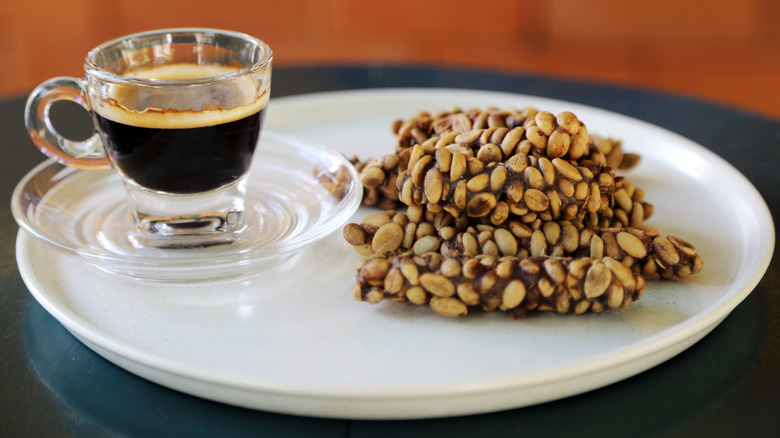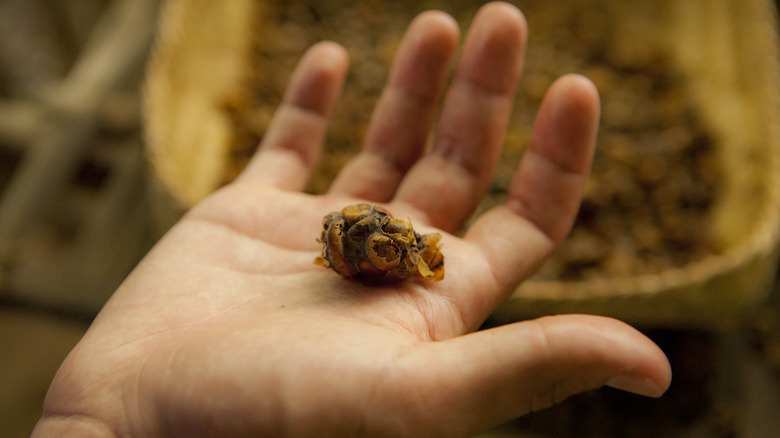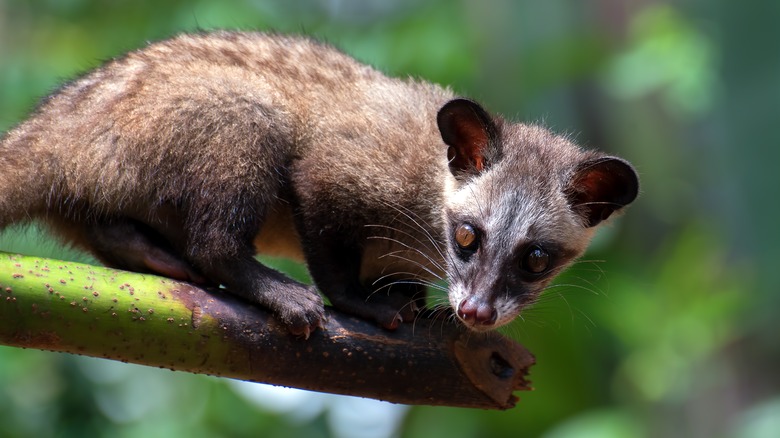Kopi Luwak Is A Very Expensive Cup Of Poop Coffee
For the most part, coffee beans are harvested in the same way, no matter what part of the world they come from. The coffee fruit is picked by hand or machine and is then sorted, processed, cleaned, dried, and so on. However, one of the world's most expensive types of coffee beans aren't harvested from coffee plants at all. Instead, the exclusive kopi luwak coffee is made from beans that are taken from the droppings of wild animals.
Asian palm civets are fairly small, cat-like mammals that eat all sorts of things, including the fruit of coffee plants. But they can't digest the beans that are inside the fruit, so the beans pass through the animals' digestive systems and end up in their excrement. Harvesters gather and sort through these droppings to extract the coffee beans, which are then cleaned and processed and ultimately roasted and sold. Some say that the acids and enzymes from the civet's digestive system positively affect the flavor of the coffee beans, creating a product that makes smoother-tasting and less acidic coffee.
Considering that actual poop is involved in its production, it's surprising to many that kopi luwak coffee beans are incredibly expensive. But their rarity and novelty play a large part in the price.
How much for crappy coffee?
Kopi luwak coffee beans that are harvested in the wild are sold for around $600 per pound. Much of this price is due to the labor-intensive way the beans must be harvested. Workers must first find the droppings of the civets, which reside in very warm and humid Asian tropical rainforests, and then the beans must be thoroughly cleaned and processed, for obvious reasons.
In some ways, finding these types of coffee beans in the wild is like hunting for morel mushrooms or truffles, which can't be farmed, either. They must be searched for and harvested by hand, making them rare, which in turn makes them more expensive to purchase.
Farmed kopi luwak coffee beans cost less because the civets are raised in captivity and fed the fruit from coffee plants, and their droppings are gathered more easily. Farmed beans have become more common than those gathered in the wild because the demand for kopi luwak coffee has greatly increased since the 1990s, when they were first exported from Indonesia. But, for unfortunate reasons, these beans are often substandard.
Civets have paid the price for luxury
In an attempt to keep up with global demand for this special coffee, several companies have resorted to keeping Asian palm civets in captivity, subjecting them to sedentary lives in small cages. This alone would affect any animal's body systems, including the digestive system, which, of course, plays a large part in creating kopi luwak coffee. Naturally omnivores with access to a variety of plant and animal-based foods, the civets on these coffee farms are fed only coffee fruit. This unhealthy diet further negatively affects the animals' digestive systems and thus the very product they're kept to produce. In addition, civets in the wild have the ability to choose which coffee fruits they will eat, determining for themselves which are good and which are not. Good fruit creates good beans, which creates better coffee, but farmed civets simply must eat what they are given, whatever the quality.
Many kopi luwak aficionados tend to agree that only those coffee beans that come from wild civets are worth seeking out, not only for the welfare of the animals but for better-tasting coffee. These beans will be more expensive, but it's well worth it to keep these animals safe and thriving in their natural habitats.


